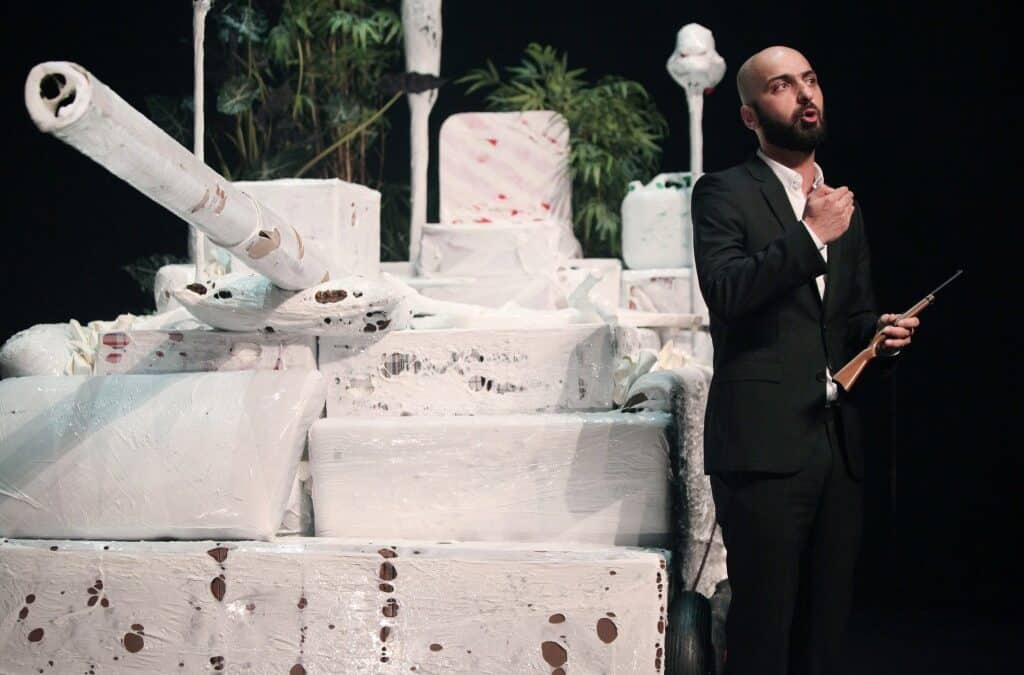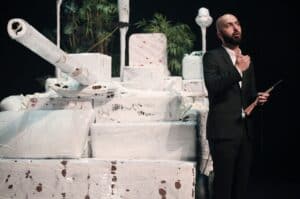This blog was first published in April 2016.
Sadettin Kirmiziyüz has not radicalised. But he feels as though perhaps he should have, because everything around him – including the security forces who continually screen the likely backgrounds of suspected terrorists – seem to believe that he either has, or will. Google his name and the internet will show it’s convinced he’s travelled to Syria.
But no, he’s here, in a theatre with us, accompanied only by a macabre makeshift tank welded together with melted plastic and constructed from the props of his former shows – most of which traded on ironic self-deprecating gags about his own Turkish heritage and his family’s immigrant or Islamic culture – and is instead recounting the moment that his son was born. And how everything was shattered and rebuilt as a result.
This is a story of radicalisation, but arrived at through the puzzle of not having radicalised: this in spite of the world apparently directing somebody towards it.
It’s about a man who has watched twenty-four beheadings online in a bid to understand and process what is being done in the name of Islam, starting on mute, and then turning up the sound little by little until he’s completely embedded within the moment.
It’s about every non-action transpiring as a political action, about how dominant cultures coerce non-native cultures into buying into, trading upon and trapping them into a particular caricature of their identity, and about how Sadettin K – writer and actor – and his entire value system for work, friends, the future and his responsibility to his identity has radically shifted.
The Radicalisation of Sadettin K. is a one-person autobiographical show of struggle and searching, as funny as it is political, as self-reflexive as it is meta-theatrical, as potent and dangerous as it is both utterly specific and somehow universal.
It’s a play of layers and layers of complexity, and it is fuelled to some extent by the writer’s reaction to ‘clicktivism’ – social media’s convenient ideological smokescreen whereby showing solidarity by adding a backdrop to your profile status somehow equates as investing in a political action.
Is that it?
This is Sadettin’s question to himself and of his Facebook friends, who declaim with pride in digital unison ‘This is Not My Islam’ in response to acts of terrorism; it kick-starts an internal reflection accompanied by a 1,500 year tour of historical Arab immigration covering the consumption of the Persian and Byzantine territories, the Crusades, and the banishment of the original caliphate (the ‘Islamic Pope’) now grotesquely resurrected in the present in the form of IS.
It’s a searching and provocative performance, searingly honest, and appropriately enough for the Live Art in Digital Times strapline of the IETM conference, fuelled in no small part by that social media force – referred to this afternoon by keynote speaker Professor Jane Norman in her address as both a weapon and a tool of trust.
This keynote address had a distinctly digital-academic peer-review quality to it – a series of linked and highly informed philosophical and theoretical items on the agenda, but more like a roll-call of recent realisations in research than a practical provocation to a bunch of thirsty theatre-makers.
I’m no stranger to academia and will bang on happily about the need for it to take its place at the table of British theatre-making, but this was a strangely rarefied reflection considering the audience – even if it does make a great academic paper.
Salient points emerged however (and please permit me some paraphrasing): the notion of the digital as a great tool of trust and community-building; as a way of making and developing a new sense of the world and a new set of ‘senses’ to interpret that world, thanks to faster data exchange and analysis; as an accelerator for artists’ endeavours as they exhibit their qualities as ‘creative extremophiles, always searching for the edge of their extremes’; and more disquietingly, the producer of ingrained day-to-day archiving habits in our own lives which see us ‘systematically storing for a future that never comes, rather than daring to stop and enjoy the present’.
This last point was made to (I counted) at least nine people using phones to take photos, Tweet or make videos. There’s nothing inherently wrong with that – I’m not the digital playwright police, and I was one of the nine.
But it put me in mind of an equally apposite quotation that I owe to the playwright Christopher Hogg, who features the words of this philosopher of narrative – Douglas Rushkoff – in his thinking around theatre and the digital culture:
‘We tend to live in the distracted present, where the forces of the periphery are magnified and those of in front of us ignored. Our ability to create, plan, much less follow through on, is undermined by our need to be able to improvise our way through any number of infernal impacts that stand to derail us at any moment.’
So far for me at IETM, the digital has been walking a tightrope between the positive and the negative, good cop and bad cop in an infinite-running crime show – both in life and in its application in theatre.
Tonight, I saw two shows that couldn’t have sat further apart on the spectrum in their relation to the digital. But more on those tomorrow – it’s time for sleep now.
Hope you’ve enjoyed today’s musings. More to come tomorrow…

